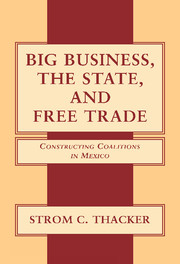Book contents
- Frontmatter
- Contents
- List of Figures
- List of Tables
- List of Abbreviations
- Acknowledgments
- 1 Introduction: International Context, Domestic Interests, and Mexican Trade Reform
- 2 Coalition Politics and Free Trade
- 3 Structural Power Relations Between Business and the Mexican State
- 4 Trade Policy Coalitions in the 1980s
- 5 Assembling Teams and Building Bridges
- 6 Business Participation in the NAFTA Negotiations
- 7 Conclusion: Mexico in Comparative Perspective
- Appendix
- References
- Index
5 - Assembling Teams and Building Bridges
Published online by Cambridge University Press: 12 January 2010
- Frontmatter
- Contents
- List of Figures
- List of Tables
- List of Abbreviations
- Acknowledgments
- 1 Introduction: International Context, Domestic Interests, and Mexican Trade Reform
- 2 Coalition Politics and Free Trade
- 3 Structural Power Relations Between Business and the Mexican State
- 4 Trade Policy Coalitions in the 1980s
- 5 Assembling Teams and Building Bridges
- 6 Business Participation in the NAFTA Negotiations
- 7 Conclusion: Mexico in Comparative Perspective
- Appendix
- References
- Index
Summary
INTRODUCTION
Mexico's participation in the NAFTA negotiations with the United States and Canada represents the final stage in the development of the free trade coalition and the incorporation of big business as an active partner in trade policy. The establishment of this free trade coalition between the state and the private sector was one of the keys behind the government's pursuit of a free trade agreement with the United States (and eventually Canada). “Its new alliance with the business sector has given the government important support to push forward this [NAFTA] proposal, with big business spearheading the process” (Pozas 1993, 84). This alliance joined together big business elites with a new generation of like-minded, financial- and planning-oriented free trade state elites that by now controlled almost all of the Mexican state's economic policy bureaucracy. This chapter examines the breadth, depth, and nature of private sector participation in trade policy and the related evolution and relative strength of competing cross-cutting business-state coalitions leading up to and during the NAFTA negotiations of 1991–92. The next section describes some of the initial efforts put forth by the Salinas administration to reassure wary investors. The following section traces the origins and makeup of the state's NAFTA negotiating team. The fourth section discusses the private sector's incorporation into the official negotiating framework and the institutional mechanisms created to channel business participation. The final section considers two possible explanations for this new consultative style of policy making.
- Type
- Chapter
- Information
- Big Business, The State, and Free TradeConstructing Coalitions in Mexico, pp. 125 - 161Publisher: Cambridge University PressPrint publication year: 2000



